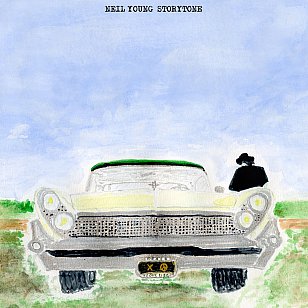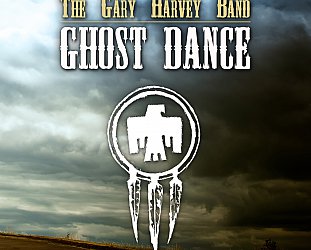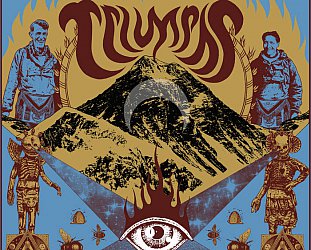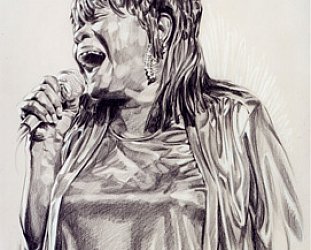Graham Reid | | 2 min read
Neil Young: When I Watch You Sleeping (solo)

We've mentioned this before so at the risk of being predictable . . . the problem with “unpredictable” Neil Young these days is that he has become predictable. So after Le Noise (true to what it said on the box) it was Americana (as it says) then Psychedelic Pill (and again).
And recently while he's been banging on about some special high-quality sound reproduction technology he releases the barely-listenable A Letter Home recorded in some lo-fi telephone-box studio which Jack White had bought.
So what next after that?
Why some songs recorded with a 96-piece orchestra, as you might expect.
This collection of new songs comes as a double disc and that is the one you need: one one disc you have Neil with two orchestra line-ups (92-piece and 60-piece) as well as swinging with a big band (think back to This Note's For You in '88). And the other disc is the same songs again but with Young at the piano or on guitar, ukulele etc.
What few could have predicted however is the content of these often nakedly confessional ruminations. They have been sparked by Young's separation from Pegi, his wife of thirtysomething years, and him taking up with actress Daryl Hannah (“a purely poisonous predator,” according to David Crosby, which would seem to put the mockers an any CSN and Young reunion).
So there are lyrics about the first flush of new love coupled with trepidation (Plastic Flowers); veiled regret (“some day you'll see me as you used to do”) and flashes of bitterness (“I got my problems but they mostly show up with you”) in Like You Used To; some awkward poetry (Tumbleweed's “your inner beauty is a peace sign to me”) and some very uneasy truth-telling which can be read as self-pitying or courageous candor: “So many people don't understand what it's like to be me, but I'm not different from anybody else . . . I'm glad I found you”.
There are also songs about the protecting the environment (Who's Gonna Stand Up); his love of cars and travel metaphors; and a swinging, Dylanesque Say Hello to Chicago (in the band version) in which he offers a snapshot moment.
This is a lot of information and on the solo album he delivers the personal ones at piano with a plain fragility which is very moving . . and that's from one who has often found his acoustic albums hard going.
The bluesy I Wanna Drive My Car is a slinky little piece delivered in barely a whisper with a sense of veiled menace, and a simple guitar line. And Say Hello to Chicago and Like You Used To have a similarly slow bluesy quality (and harmonica). Even that slightly cringe-inducing Tumbleweed sounds rather cute on ukulele (and you'll recognise the standard he's appropriated for it).
It's almost impossible not to like When I Watch You Sleeping for its unadorned simplicity of lyric and tune.
The orchestrated and big band disc recasts these songs and sentiments very differently, sometimes in a slightly kitschy, musical theatre way. But Who's Gonna Stand Up is given more drama and urgency, and both Glimmer and Tumbleweed are given romantic settings from the Fifties.
And those horns really punch in behind Young's sometimes flat delivery on I Want to Drive My Car and Say Hello to Chicago.
So we might now reconsider our position as say, Yep, Neil Young is 'unpredictable' alright.”
However for his first album with a full orchestra you might wish he'd had stronger lyrical material to work with.
But these two discs – slightly different emotional input on each, aside from the musical settings – is a damn fine collection.
But as always . . . Archives Vol 2 please?
There is a lot of Neil Young at Elsewhere, including some attempts at interviews. Start here.





post a comment